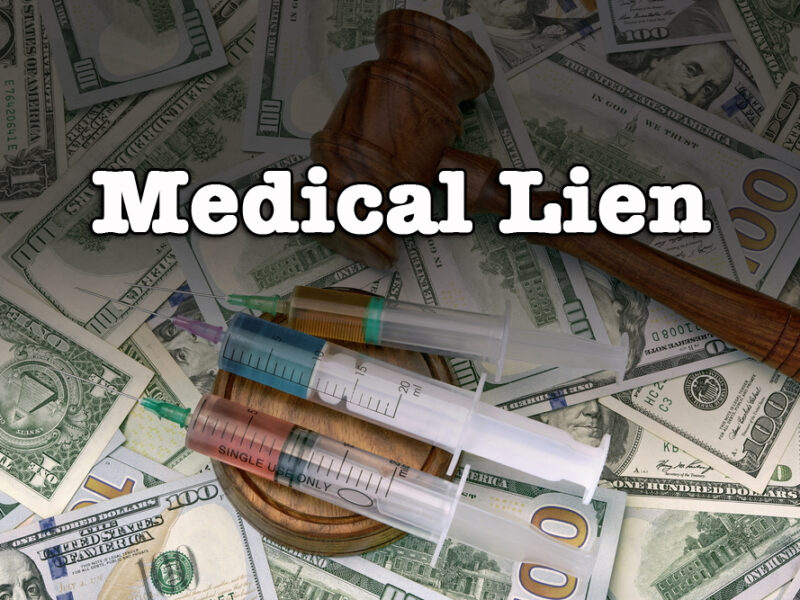When you’re injured in an accident, getting proper medical treatment should be your top priority. However, the cost of medical care can be overwhelming, especially if you don’t have health insurance or your insurance won’t cover accident-related treatment. This is where medical liens in personal injury cases come into play.
What Is a Medical Lien?
A medical lien is a legal agreement between you, your attorney, and a healthcare provider. The provider agrees to treat you without upfront payment, in exchange for receiving payment directly from your future personal injury settlement or judgment. The lien gives the medical provider a legal right to be paid from your case proceeds before you receive your portion.
How Medical Liens Work in California Personal Injury Cases
In California, medical liens are governed by specific laws and regulations that protect both patients and providers. When you agree to treatment under a medical lien:
- The healthcare provider documents the services and costs
- You sign a lien agreement allowing payment from your settlement
- Your attorney acknowledges the lien and agrees to protect the provider’s interests
- The provider cannot bill you directly while your case is pending
- Payment is made from your settlement proceeds before you receive compensation
Advantages of Medical Liens
Immediate Access to Treatment
The most significant benefit is getting necessary medical care without delay. You don’t need to worry about upfront costs or insurance approval, allowing you to focus on recovery.
Quality Care Options
Many high-quality medical providers accept liens, giving you access to specialized treatment you might not otherwise afford. This includes orthopedic surgeons, neurologists, and other specialists crucial for serious injuries.
No Initial Out-of-Pocket Expenses
Treatment under a medical lien means you don’t pay anything upfront. This can be particularly valuable when you’re unable to work due to your injuries and facing financial strain.
Strengthening Your Case
Consistent, well-documented medical treatment strengthens your personal injury claim. Providers working under liens typically maintain detailed records that can support your case.
Disadvantages and Risks
Higher Treatment Costs
Medical providers often charge more when treating under a lien compared to standard insurance rates. These higher costs can significantly impact your final settlement amount.
Reduced Settlement Proceeds
Because medical liens must be paid from your settlement, a substantial portion of your compensation may go to medical providers rather than to you directly.
Limited Provider Options
Not all healthcare providers accept medical liens. This can restrict your choice of doctors and facilities, potentially requiring you to travel further for treatment.
Complex Negotiations
Lien resolution can complicate settlement negotiations. Multiple lien holders may need to negotiate their payments, potentially delaying your case resolution.
Important Considerations Before Accepting Lien-Based Treatment
Evaluate Your Insurance Options
Before agreeing to treatment under a lien, thoroughly review your existing health insurance coverage. Sometimes, using your health insurance can be more cost-effective, even with deductibles and co-pays.
Understand the Terms
Carefully review all lien agreements with your attorney. Pay particular attention to:
- Treatment costs and billing practices
- Provider’s right to payment from settlement
- Your obligations if the case is unsuccessful
- Interest charges or additional fees
Consider Future Medical Needs
Think about your long-term medical requirements. Will you need ongoing care after your case settles? How will you pay for it? These factors should influence your decision about lien-based treatment.
Legal Protections in California
California law provides several protections for patients receiving treatment under medical liens:
Maximum Recovery Limits
Medical providers cannot recover more than the reasonable value of their services, even if their billed charges are higher.
Negotiation Rights
Your attorney can negotiate lien amounts on your behalf, potentially reducing the final amount you owe providers.
Disclosure Requirements
Providers must clearly disclose their lien rights and billing practices before beginning treatment.
Working with Your Attorney
Your personal injury attorney plays a crucial role in managing medical liens. They should:
- Review all lien agreements before you sign
- Monitor treatment costs and documentation
- Negotiate with providers to reduce lien amounts
- Ensure proper distribution of settlement funds
- Protect your interests throughout the process
Best Practices for Managing Medical Liens
Document Everything
Keep detailed records of all medical treatments, communications with providers, and lien agreements. This documentation helps prevent disputes and supports lien negotiations.
Regular Communication
Maintain open communication with your attorney about your medical treatment and any concerns about liens. Early identification of potential issues allows for better management.
Understanding Your Rights
Familiarize yourself with your rights under California lien laws. This knowledge helps you make informed decisions about your medical care and case management.
When Medical Liens May Be Your Best Option
Medical liens can be particularly beneficial in certain situations:
- When you lack health insurance
- If your insurance denies accident-related treatment
- When you need specialized care not covered by insurance
- If you cannot afford high deductibles or co-pays
- When immediate treatment is crucial for your recovery
Conclusion
Medical liens serve an important purpose in personal injury cases, providing access to necessary medical care when traditional payment options aren’t viable. However, they come with significant responsibilities and potential drawbacks that require careful consideration.
Before agreeing to treatment under a medical lien, consult with your personal injury attorney to understand the full implications. They can help you evaluate whether liens are your best option and ensure your interests are protected throughout your case.
Remember that while medical liens can provide crucial access to care, they should be approached with a clear understanding of both their benefits and limitations. Your attorney’s guidance is essential in navigating these complex arrangements and achieving the best possible outcome for your personal injury case.
If you’ve been injured here in California, we invite you to call us here at Woolf Legal for a free consultation.

